Comprehensive Analysis of Quality Management in Tesco (Business Org 1)
VerifiedAdded on 2023/01/11
|9
|2618
|54
Report
AI Summary
This report provides a comprehensive analysis of quality management within Tesco, a major retail organization. It begins by defining quality management and highlighting its significance in achieving customer satisfaction, brand loyalty, and a competitive edge within the retail industry. The report then delves into the importance of quality management for Tesco, detailing how it enhances product efficiency, increases customer satisfaction, boosts profitability, and builds a strong brand image. The report also discusses the advantages of implementing a quality system, such as improved efficiency, risk management, employee communication, and customer satisfaction. Furthermore, the report addresses the disadvantages of quality management, including production disruptions, employee resistance, high costs, and potential discouragement of creativity. Overall, the report offers a balanced perspective on the benefits and challenges of quality management in the context of Tesco's business operations.
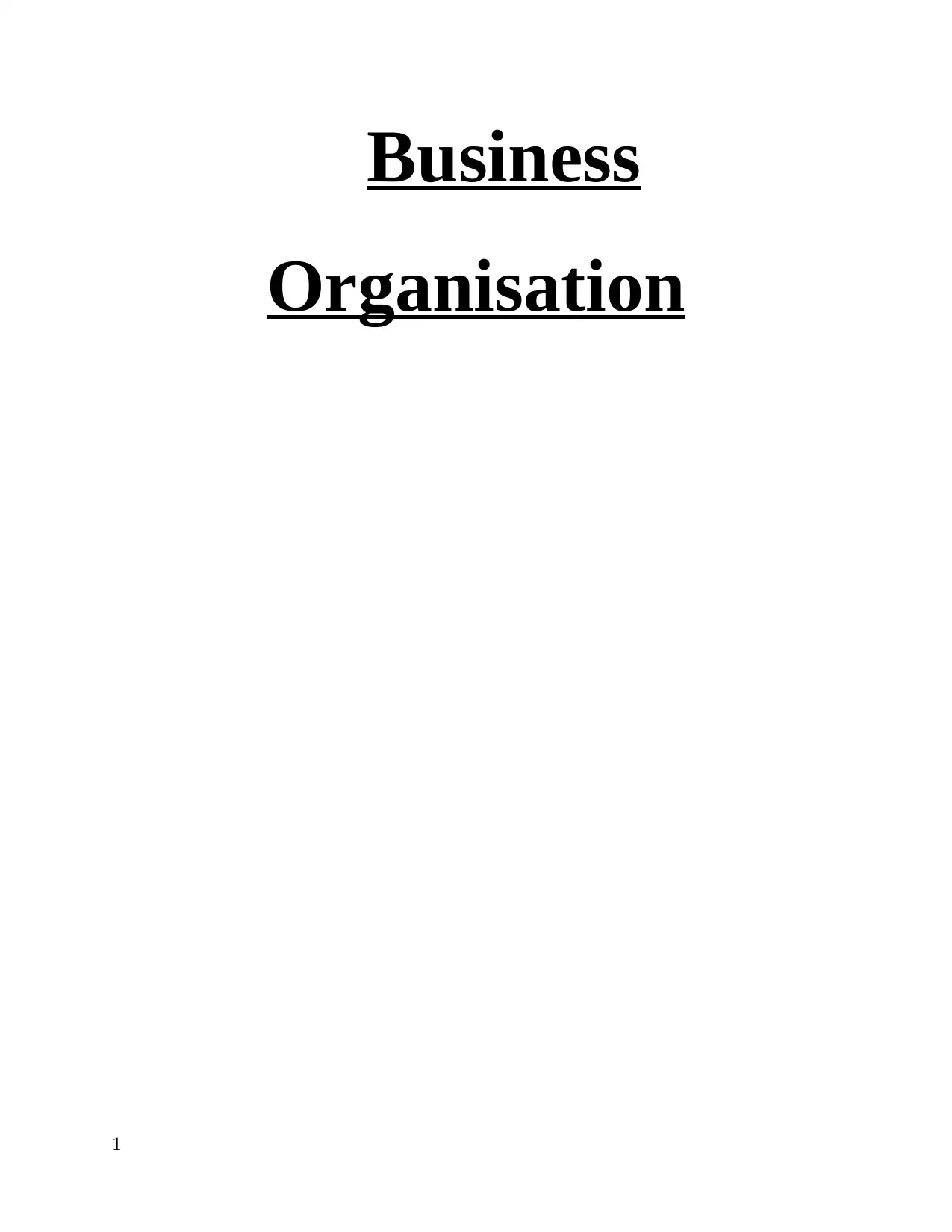
Business
Organisation
1
Organisation
1
Paraphrase This Document
Need a fresh take? Get an instant paraphrase of this document with our AI Paraphraser
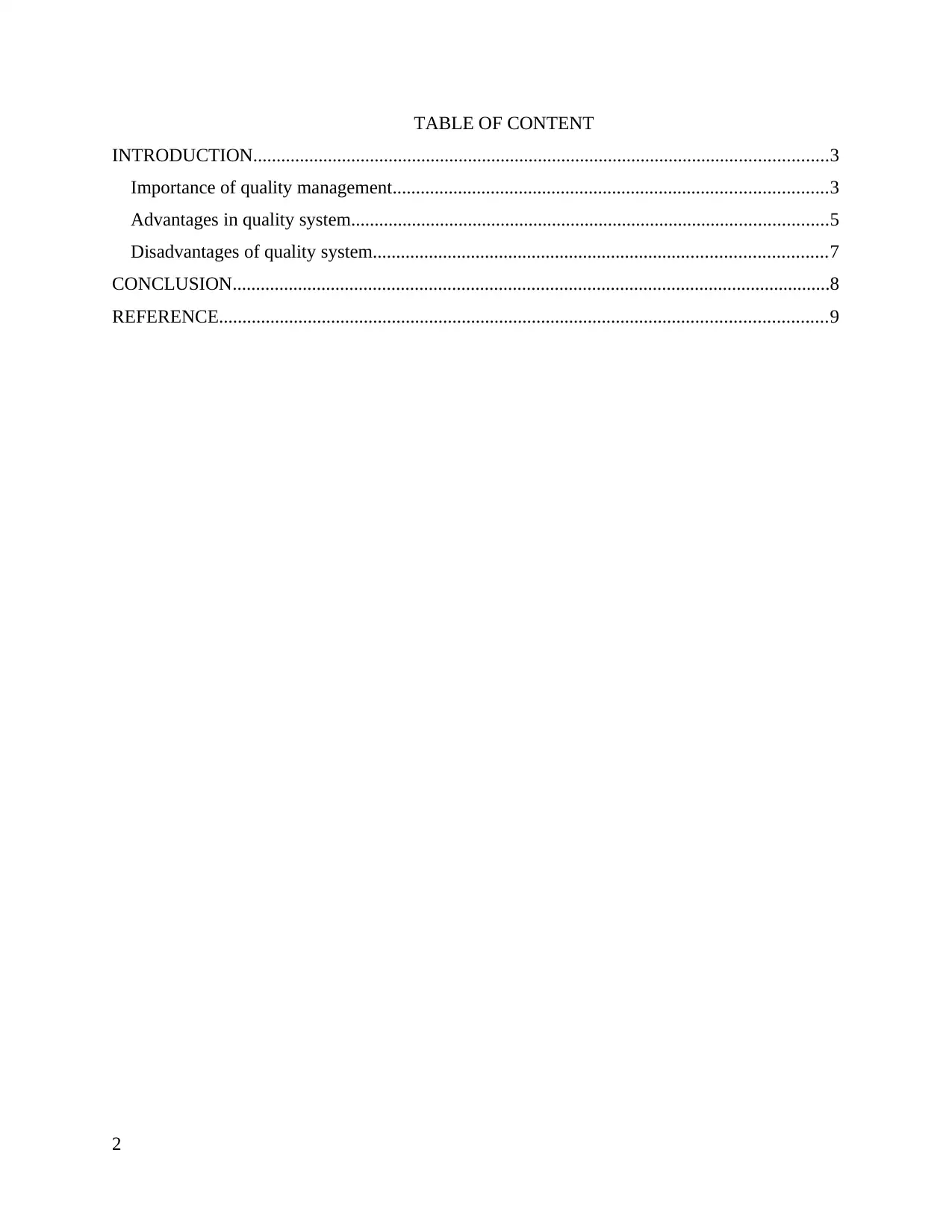
TABLE OF CONTENT
INTRODUCTION...........................................................................................................................3
Importance of quality management.............................................................................................3
Advantages in quality system......................................................................................................5
Disadvantages of quality system.................................................................................................7
CONCLUSION................................................................................................................................8
REFERENCE..................................................................................................................................9
2
INTRODUCTION...........................................................................................................................3
Importance of quality management.............................................................................................3
Advantages in quality system......................................................................................................5
Disadvantages of quality system.................................................................................................7
CONCLUSION................................................................................................................................8
REFERENCE..................................................................................................................................9
2
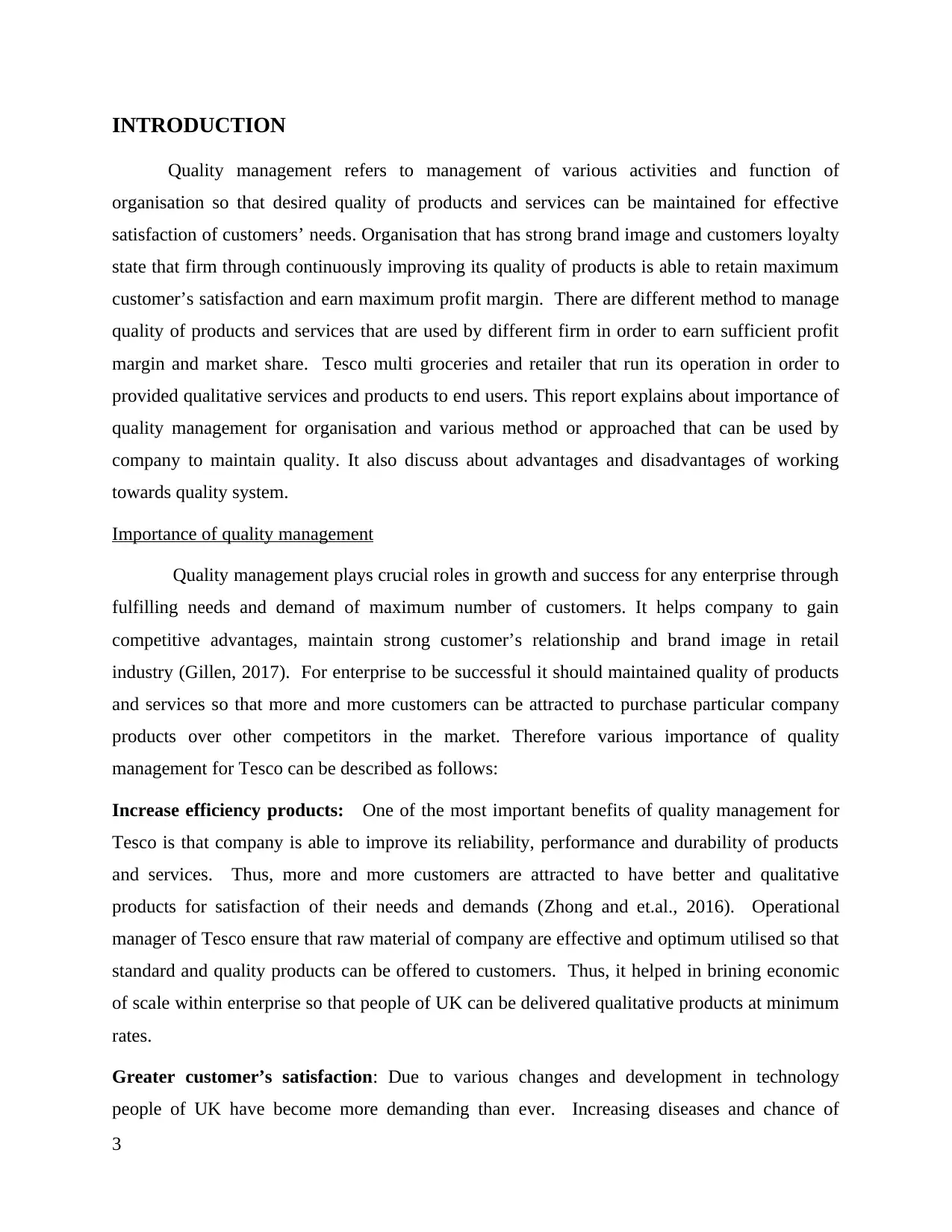
INTRODUCTION
Quality management refers to management of various activities and function of
organisation so that desired quality of products and services can be maintained for effective
satisfaction of customers’ needs. Organisation that has strong brand image and customers loyalty
state that firm through continuously improving its quality of products is able to retain maximum
customer’s satisfaction and earn maximum profit margin. There are different method to manage
quality of products and services that are used by different firm in order to earn sufficient profit
margin and market share. Tesco multi groceries and retailer that run its operation in order to
provided qualitative services and products to end users. This report explains about importance of
quality management for organisation and various method or approached that can be used by
company to maintain quality. It also discuss about advantages and disadvantages of working
towards quality system.
Importance of quality management
Quality management plays crucial roles in growth and success for any enterprise through
fulfilling needs and demand of maximum number of customers. It helps company to gain
competitive advantages, maintain strong customer’s relationship and brand image in retail
industry (Gillen, 2017). For enterprise to be successful it should maintained quality of products
and services so that more and more customers can be attracted to purchase particular company
products over other competitors in the market. Therefore various importance of quality
management for Tesco can be described as follows:
Increase efficiency products: One of the most important benefits of quality management for
Tesco is that company is able to improve its reliability, performance and durability of products
and services. Thus, more and more customers are attracted to have better and qualitative
products for satisfaction of their needs and demands (Zhong and et.al., 2016). Operational
manager of Tesco ensure that raw material of company are effective and optimum utilised so that
standard and quality products can be offered to customers. Thus, it helped in brining economic
of scale within enterprise so that people of UK can be delivered qualitative products at minimum
rates.
Greater customer’s satisfaction: Due to various changes and development in technology
people of UK have become more demanding than ever. Increasing diseases and chance of
3
Quality management refers to management of various activities and function of
organisation so that desired quality of products and services can be maintained for effective
satisfaction of customers’ needs. Organisation that has strong brand image and customers loyalty
state that firm through continuously improving its quality of products is able to retain maximum
customer’s satisfaction and earn maximum profit margin. There are different method to manage
quality of products and services that are used by different firm in order to earn sufficient profit
margin and market share. Tesco multi groceries and retailer that run its operation in order to
provided qualitative services and products to end users. This report explains about importance of
quality management for organisation and various method or approached that can be used by
company to maintain quality. It also discuss about advantages and disadvantages of working
towards quality system.
Importance of quality management
Quality management plays crucial roles in growth and success for any enterprise through
fulfilling needs and demand of maximum number of customers. It helps company to gain
competitive advantages, maintain strong customer’s relationship and brand image in retail
industry (Gillen, 2017). For enterprise to be successful it should maintained quality of products
and services so that more and more customers can be attracted to purchase particular company
products over other competitors in the market. Therefore various importance of quality
management for Tesco can be described as follows:
Increase efficiency products: One of the most important benefits of quality management for
Tesco is that company is able to improve its reliability, performance and durability of products
and services. Thus, more and more customers are attracted to have better and qualitative
products for satisfaction of their needs and demands (Zhong and et.al., 2016). Operational
manager of Tesco ensure that raw material of company are effective and optimum utilised so that
standard and quality products can be offered to customers. Thus, it helped in brining economic
of scale within enterprise so that people of UK can be delivered qualitative products at minimum
rates.
Greater customer’s satisfaction: Due to various changes and development in technology
people of UK have become more demanding than ever. Increasing diseases and chance of
3
⊘ This is a preview!⊘
Do you want full access?
Subscribe today to unlock all pages.

Trusted by 1+ million students worldwide
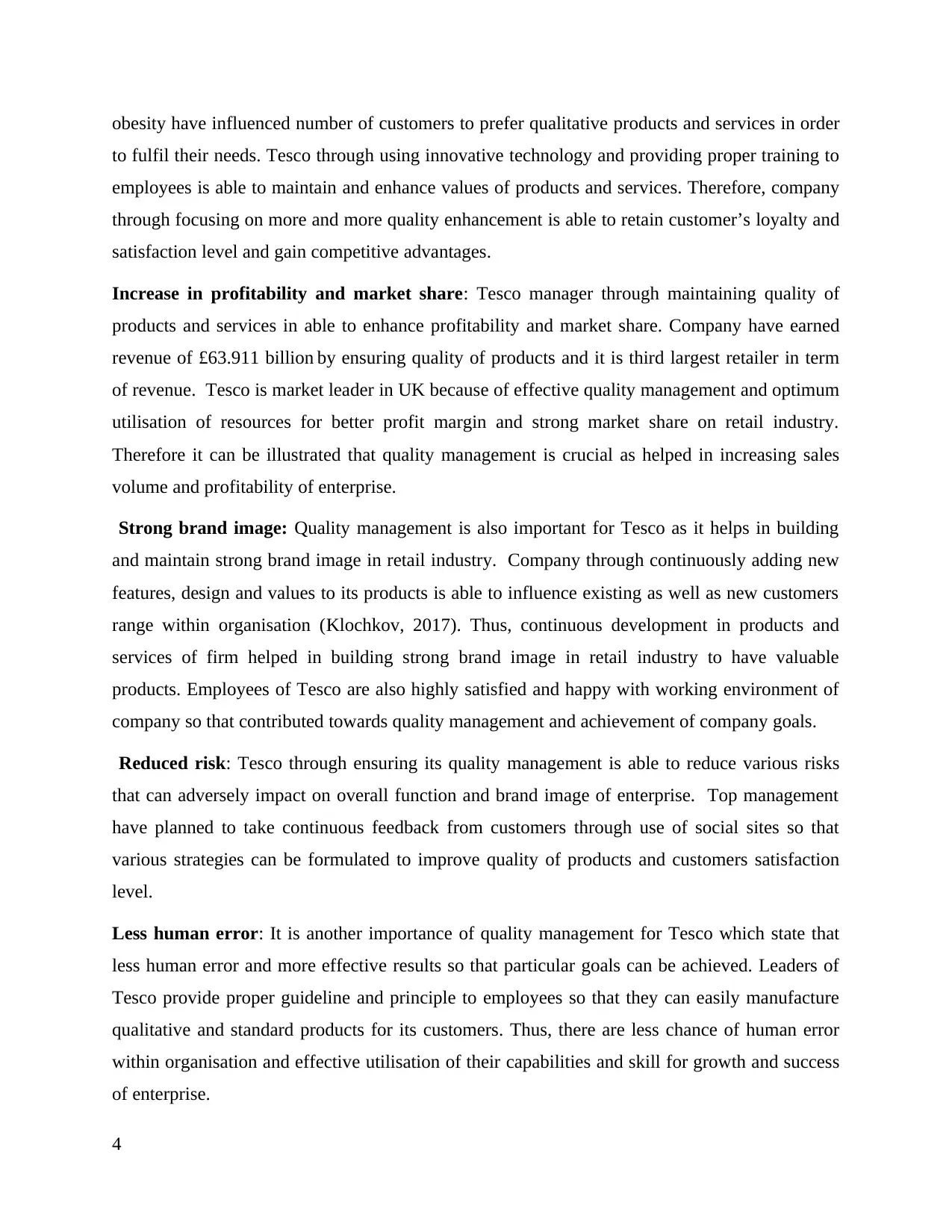
obesity have influenced number of customers to prefer qualitative products and services in order
to fulfil their needs. Tesco through using innovative technology and providing proper training to
employees is able to maintain and enhance values of products and services. Therefore, company
through focusing on more and more quality enhancement is able to retain customer’s loyalty and
satisfaction level and gain competitive advantages.
Increase in profitability and market share: Tesco manager through maintaining quality of
products and services in able to enhance profitability and market share. Company have earned
revenue of £63.911 billion by ensuring quality of products and it is third largest retailer in term
of revenue. Tesco is market leader in UK because of effective quality management and optimum
utilisation of resources for better profit margin and strong market share on retail industry.
Therefore it can be illustrated that quality management is crucial as helped in increasing sales
volume and profitability of enterprise.
Strong brand image: Quality management is also important for Tesco as it helps in building
and maintain strong brand image in retail industry. Company through continuously adding new
features, design and values to its products is able to influence existing as well as new customers
range within organisation (Klochkov, 2017). Thus, continuous development in products and
services of firm helped in building strong brand image in retail industry to have valuable
products. Employees of Tesco are also highly satisfied and happy with working environment of
company so that contributed towards quality management and achievement of company goals.
Reduced risk: Tesco through ensuring its quality management is able to reduce various risks
that can adversely impact on overall function and brand image of enterprise. Top management
have planned to take continuous feedback from customers through use of social sites so that
various strategies can be formulated to improve quality of products and customers satisfaction
level.
Less human error: It is another importance of quality management for Tesco which state that
less human error and more effective results so that particular goals can be achieved. Leaders of
Tesco provide proper guideline and principle to employees so that they can easily manufacture
qualitative and standard products for its customers. Thus, there are less chance of human error
within organisation and effective utilisation of their capabilities and skill for growth and success
of enterprise.
4
to fulfil their needs. Tesco through using innovative technology and providing proper training to
employees is able to maintain and enhance values of products and services. Therefore, company
through focusing on more and more quality enhancement is able to retain customer’s loyalty and
satisfaction level and gain competitive advantages.
Increase in profitability and market share: Tesco manager through maintaining quality of
products and services in able to enhance profitability and market share. Company have earned
revenue of £63.911 billion by ensuring quality of products and it is third largest retailer in term
of revenue. Tesco is market leader in UK because of effective quality management and optimum
utilisation of resources for better profit margin and strong market share on retail industry.
Therefore it can be illustrated that quality management is crucial as helped in increasing sales
volume and profitability of enterprise.
Strong brand image: Quality management is also important for Tesco as it helps in building
and maintain strong brand image in retail industry. Company through continuously adding new
features, design and values to its products is able to influence existing as well as new customers
range within organisation (Klochkov, 2017). Thus, continuous development in products and
services of firm helped in building strong brand image in retail industry to have valuable
products. Employees of Tesco are also highly satisfied and happy with working environment of
company so that contributed towards quality management and achievement of company goals.
Reduced risk: Tesco through ensuring its quality management is able to reduce various risks
that can adversely impact on overall function and brand image of enterprise. Top management
have planned to take continuous feedback from customers through use of social sites so that
various strategies can be formulated to improve quality of products and customers satisfaction
level.
Less human error: It is another importance of quality management for Tesco which state that
less human error and more effective results so that particular goals can be achieved. Leaders of
Tesco provide proper guideline and principle to employees so that they can easily manufacture
qualitative and standard products for its customers. Thus, there are less chance of human error
within organisation and effective utilisation of their capabilities and skill for growth and success
of enterprise.
4
Paraphrase This Document
Need a fresh take? Get an instant paraphrase of this document with our AI Paraphraser
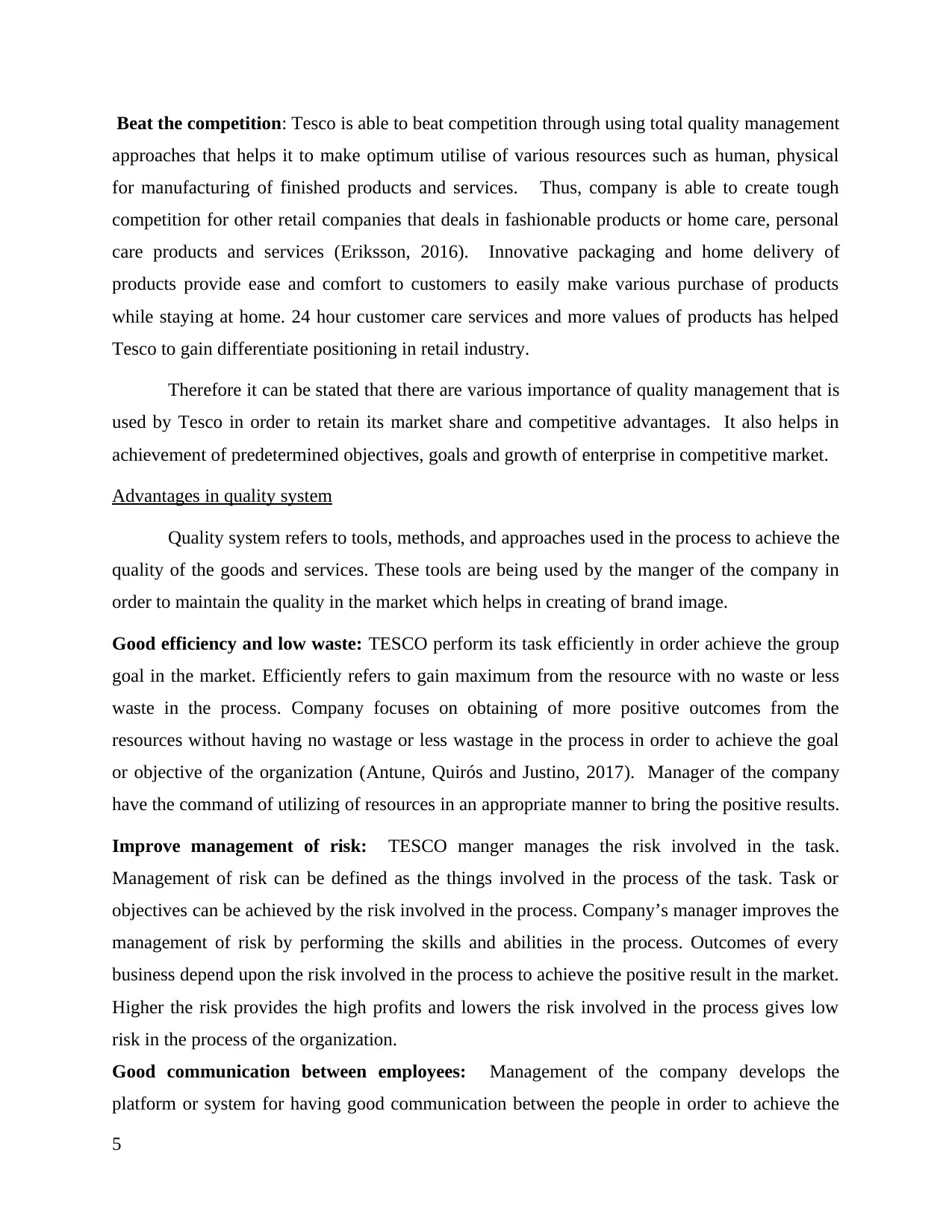
Beat the competition: Tesco is able to beat competition through using total quality management
approaches that helps it to make optimum utilise of various resources such as human, physical
for manufacturing of finished products and services. Thus, company is able to create tough
competition for other retail companies that deals in fashionable products or home care, personal
care products and services (Eriksson, 2016). Innovative packaging and home delivery of
products provide ease and comfort to customers to easily make various purchase of products
while staying at home. 24 hour customer care services and more values of products has helped
Tesco to gain differentiate positioning in retail industry.
Therefore it can be stated that there are various importance of quality management that is
used by Tesco in order to retain its market share and competitive advantages. It also helps in
achievement of predetermined objectives, goals and growth of enterprise in competitive market.
Advantages in quality system
Quality system refers to tools, methods, and approaches used in the process to achieve the
quality of the goods and services. These tools are being used by the manger of the company in
order to maintain the quality in the market which helps in creating of brand image.
Good efficiency and low waste: TESCO perform its task efficiently in order achieve the group
goal in the market. Efficiently refers to gain maximum from the resource with no waste or less
waste in the process. Company focuses on obtaining of more positive outcomes from the
resources without having no wastage or less wastage in the process in order to achieve the goal
or objective of the organization (Antune, Quirós and Justino, 2017). Manager of the company
have the command of utilizing of resources in an appropriate manner to bring the positive results.
Improve management of risk: TESCO manger manages the risk involved in the task.
Management of risk can be defined as the things involved in the process of the task. Task or
objectives can be achieved by the risk involved in the process. Company’s manager improves the
management of risk by performing the skills and abilities in the process. Outcomes of every
business depend upon the risk involved in the process to achieve the positive result in the market.
Higher the risk provides the high profits and lowers the risk involved in the process gives low
risk in the process of the organization.
Good communication between employees: Management of the company develops the
platform or system for having good communication between the people in order to achieve the
5
approaches that helps it to make optimum utilise of various resources such as human, physical
for manufacturing of finished products and services. Thus, company is able to create tough
competition for other retail companies that deals in fashionable products or home care, personal
care products and services (Eriksson, 2016). Innovative packaging and home delivery of
products provide ease and comfort to customers to easily make various purchase of products
while staying at home. 24 hour customer care services and more values of products has helped
Tesco to gain differentiate positioning in retail industry.
Therefore it can be stated that there are various importance of quality management that is
used by Tesco in order to retain its market share and competitive advantages. It also helps in
achievement of predetermined objectives, goals and growth of enterprise in competitive market.
Advantages in quality system
Quality system refers to tools, methods, and approaches used in the process to achieve the
quality of the goods and services. These tools are being used by the manger of the company in
order to maintain the quality in the market which helps in creating of brand image.
Good efficiency and low waste: TESCO perform its task efficiently in order achieve the group
goal in the market. Efficiently refers to gain maximum from the resource with no waste or less
waste in the process. Company focuses on obtaining of more positive outcomes from the
resources without having no wastage or less wastage in the process in order to achieve the goal
or objective of the organization (Antune, Quirós and Justino, 2017). Manager of the company
have the command of utilizing of resources in an appropriate manner to bring the positive results.
Improve management of risk: TESCO manger manages the risk involved in the task.
Management of risk can be defined as the things involved in the process of the task. Task or
objectives can be achieved by the risk involved in the process. Company’s manager improves the
management of risk by performing the skills and abilities in the process. Outcomes of every
business depend upon the risk involved in the process to achieve the positive result in the market.
Higher the risk provides the high profits and lowers the risk involved in the process gives low
risk in the process of the organization.
Good communication between employees: Management of the company develops the
platform or system for having good communication between the people in order to achieve the
5
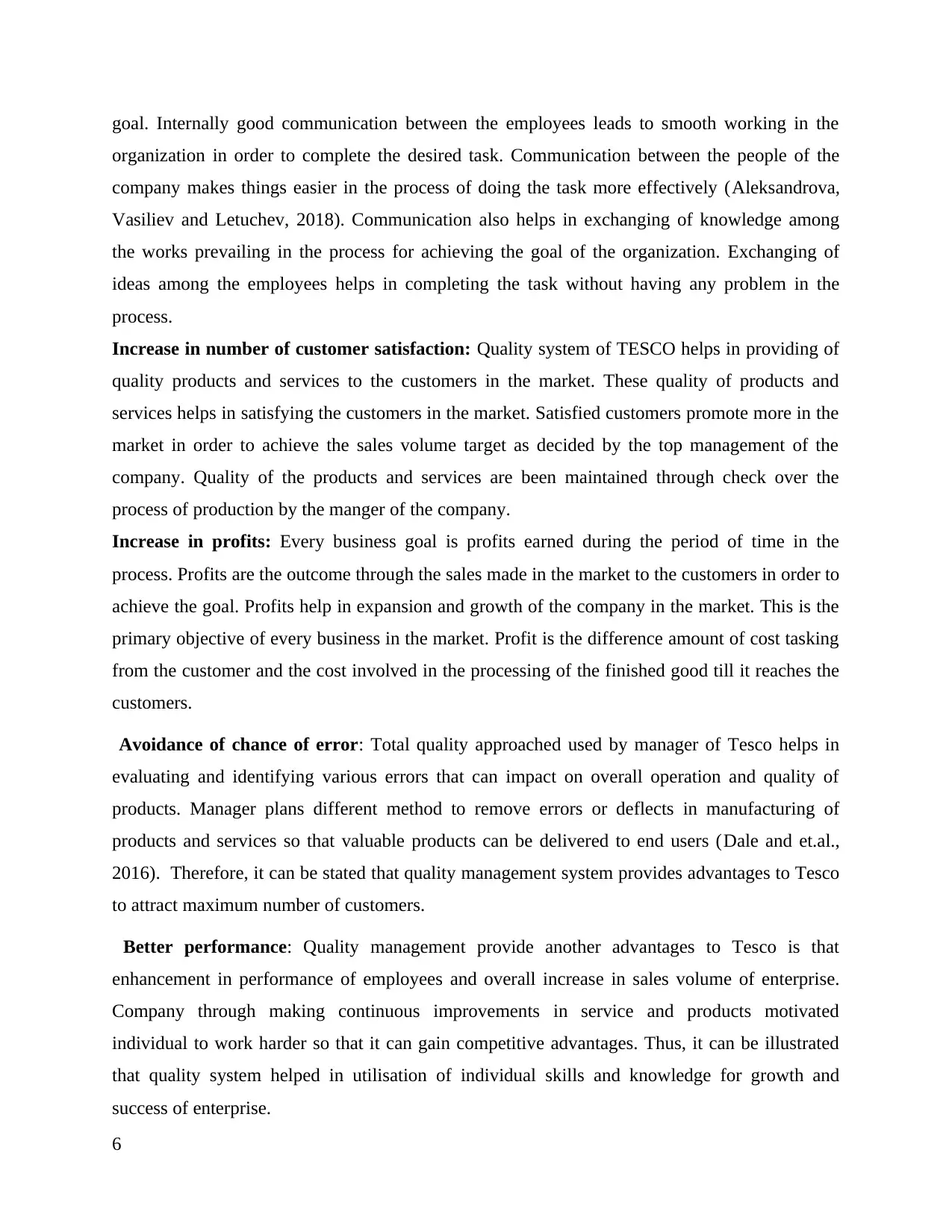
goal. Internally good communication between the employees leads to smooth working in the
organization in order to complete the desired task. Communication between the people of the
company makes things easier in the process of doing the task more effectively (Aleksandrova,
Vasiliev and Letuchev, 2018). Communication also helps in exchanging of knowledge among
the works prevailing in the process for achieving the goal of the organization. Exchanging of
ideas among the employees helps in completing the task without having any problem in the
process.
Increase in number of customer satisfaction: Quality system of TESCO helps in providing of
quality products and services to the customers in the market. These quality of products and
services helps in satisfying the customers in the market. Satisfied customers promote more in the
market in order to achieve the sales volume target as decided by the top management of the
company. Quality of the products and services are been maintained through check over the
process of production by the manger of the company.
Increase in profits: Every business goal is profits earned during the period of time in the
process. Profits are the outcome through the sales made in the market to the customers in order to
achieve the goal. Profits help in expansion and growth of the company in the market. This is the
primary objective of every business in the market. Profit is the difference amount of cost tasking
from the customer and the cost involved in the processing of the finished good till it reaches the
customers.
Avoidance of chance of error: Total quality approached used by manager of Tesco helps in
evaluating and identifying various errors that can impact on overall operation and quality of
products. Manager plans different method to remove errors or deflects in manufacturing of
products and services so that valuable products can be delivered to end users (Dale and et.al.,
2016). Therefore, it can be stated that quality management system provides advantages to Tesco
to attract maximum number of customers.
Better performance: Quality management provide another advantages to Tesco is that
enhancement in performance of employees and overall increase in sales volume of enterprise.
Company through making continuous improvements in service and products motivated
individual to work harder so that it can gain competitive advantages. Thus, it can be illustrated
that quality system helped in utilisation of individual skills and knowledge for growth and
success of enterprise.
6
organization in order to complete the desired task. Communication between the people of the
company makes things easier in the process of doing the task more effectively (Aleksandrova,
Vasiliev and Letuchev, 2018). Communication also helps in exchanging of knowledge among
the works prevailing in the process for achieving the goal of the organization. Exchanging of
ideas among the employees helps in completing the task without having any problem in the
process.
Increase in number of customer satisfaction: Quality system of TESCO helps in providing of
quality products and services to the customers in the market. These quality of products and
services helps in satisfying the customers in the market. Satisfied customers promote more in the
market in order to achieve the sales volume target as decided by the top management of the
company. Quality of the products and services are been maintained through check over the
process of production by the manger of the company.
Increase in profits: Every business goal is profits earned during the period of time in the
process. Profits are the outcome through the sales made in the market to the customers in order to
achieve the goal. Profits help in expansion and growth of the company in the market. This is the
primary objective of every business in the market. Profit is the difference amount of cost tasking
from the customer and the cost involved in the processing of the finished good till it reaches the
customers.
Avoidance of chance of error: Total quality approached used by manager of Tesco helps in
evaluating and identifying various errors that can impact on overall operation and quality of
products. Manager plans different method to remove errors or deflects in manufacturing of
products and services so that valuable products can be delivered to end users (Dale and et.al.,
2016). Therefore, it can be stated that quality management system provides advantages to Tesco
to attract maximum number of customers.
Better performance: Quality management provide another advantages to Tesco is that
enhancement in performance of employees and overall increase in sales volume of enterprise.
Company through making continuous improvements in service and products motivated
individual to work harder so that it can gain competitive advantages. Thus, it can be illustrated
that quality system helped in utilisation of individual skills and knowledge for growth and
success of enterprise.
6
⊘ This is a preview!⊘
Do you want full access?
Subscribe today to unlock all pages.

Trusted by 1+ million students worldwide
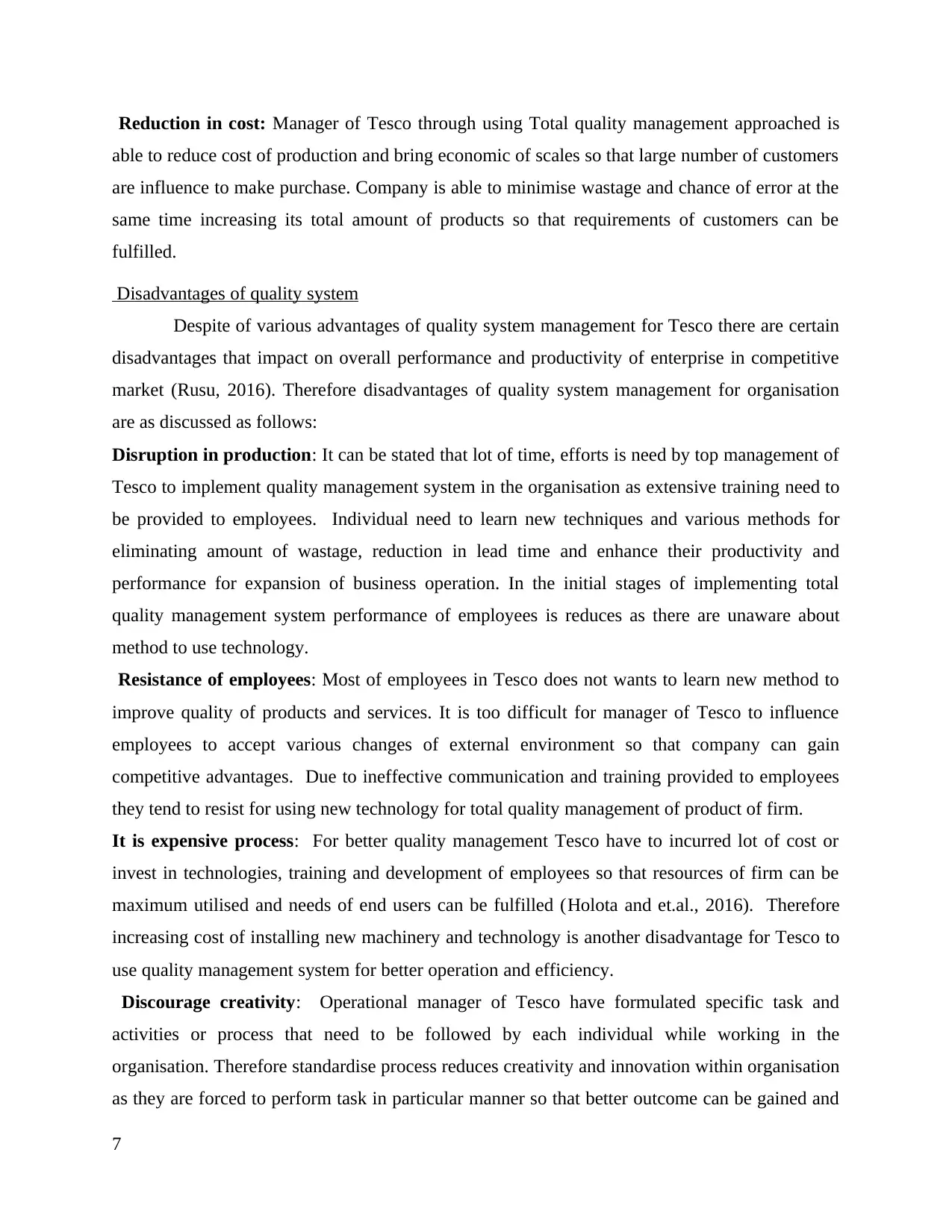
Reduction in cost: Manager of Tesco through using Total quality management approached is
able to reduce cost of production and bring economic of scales so that large number of customers
are influence to make purchase. Company is able to minimise wastage and chance of error at the
same time increasing its total amount of products so that requirements of customers can be
fulfilled.
Disadvantages of quality system
Despite of various advantages of quality system management for Tesco there are certain
disadvantages that impact on overall performance and productivity of enterprise in competitive
market (Rusu, 2016). Therefore disadvantages of quality system management for organisation
are as discussed as follows:
Disruption in production: It can be stated that lot of time, efforts is need by top management of
Tesco to implement quality management system in the organisation as extensive training need to
be provided to employees. Individual need to learn new techniques and various methods for
eliminating amount of wastage, reduction in lead time and enhance their productivity and
performance for expansion of business operation. In the initial stages of implementing total
quality management system performance of employees is reduces as there are unaware about
method to use technology.
Resistance of employees: Most of employees in Tesco does not wants to learn new method to
improve quality of products and services. It is too difficult for manager of Tesco to influence
employees to accept various changes of external environment so that company can gain
competitive advantages. Due to ineffective communication and training provided to employees
they tend to resist for using new technology for total quality management of product of firm.
It is expensive process: For better quality management Tesco have to incurred lot of cost or
invest in technologies, training and development of employees so that resources of firm can be
maximum utilised and needs of end users can be fulfilled (Holota and et.al., 2016). Therefore
increasing cost of installing new machinery and technology is another disadvantage for Tesco to
use quality management system for better operation and efficiency.
Discourage creativity: Operational manager of Tesco have formulated specific task and
activities or process that need to be followed by each individual while working in the
organisation. Therefore standardise process reduces creativity and innovation within organisation
as they are forced to perform task in particular manner so that better outcome can be gained and
7
able to reduce cost of production and bring economic of scales so that large number of customers
are influence to make purchase. Company is able to minimise wastage and chance of error at the
same time increasing its total amount of products so that requirements of customers can be
fulfilled.
Disadvantages of quality system
Despite of various advantages of quality system management for Tesco there are certain
disadvantages that impact on overall performance and productivity of enterprise in competitive
market (Rusu, 2016). Therefore disadvantages of quality system management for organisation
are as discussed as follows:
Disruption in production: It can be stated that lot of time, efforts is need by top management of
Tesco to implement quality management system in the organisation as extensive training need to
be provided to employees. Individual need to learn new techniques and various methods for
eliminating amount of wastage, reduction in lead time and enhance their productivity and
performance for expansion of business operation. In the initial stages of implementing total
quality management system performance of employees is reduces as there are unaware about
method to use technology.
Resistance of employees: Most of employees in Tesco does not wants to learn new method to
improve quality of products and services. It is too difficult for manager of Tesco to influence
employees to accept various changes of external environment so that company can gain
competitive advantages. Due to ineffective communication and training provided to employees
they tend to resist for using new technology for total quality management of product of firm.
It is expensive process: For better quality management Tesco have to incurred lot of cost or
invest in technologies, training and development of employees so that resources of firm can be
maximum utilised and needs of end users can be fulfilled (Holota and et.al., 2016). Therefore
increasing cost of installing new machinery and technology is another disadvantage for Tesco to
use quality management system for better operation and efficiency.
Discourage creativity: Operational manager of Tesco have formulated specific task and
activities or process that need to be followed by each individual while working in the
organisation. Therefore standardise process reduces creativity and innovation within organisation
as they are forced to perform task in particular manner so that better outcome can be gained and
7
Paraphrase This Document
Need a fresh take? Get an instant paraphrase of this document with our AI Paraphraser
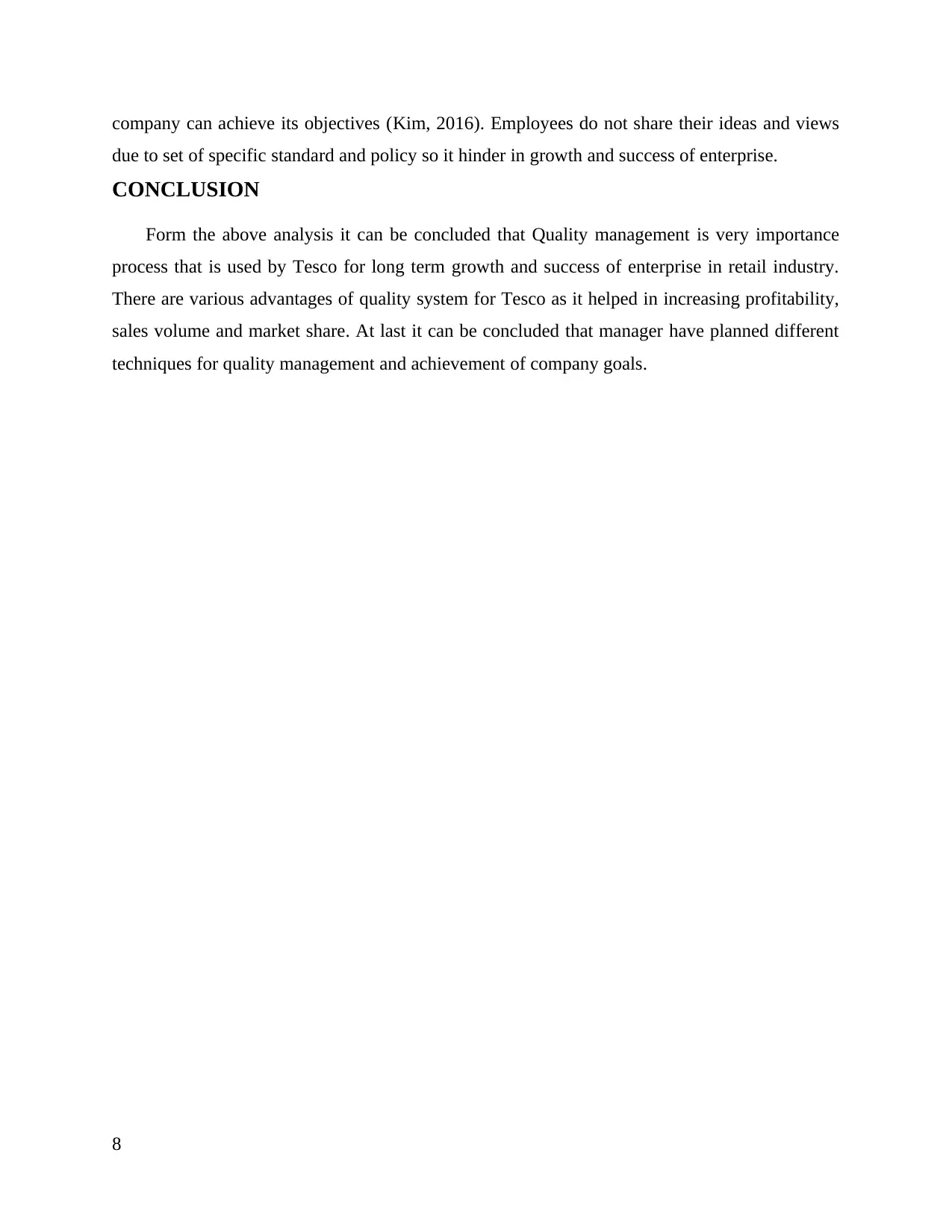
company can achieve its objectives (Kim, 2016). Employees do not share their ideas and views
due to set of specific standard and policy so it hinder in growth and success of enterprise.
CONCLUSION
Form the above analysis it can be concluded that Quality management is very importance
process that is used by Tesco for long term growth and success of enterprise in retail industry.
There are various advantages of quality system for Tesco as it helped in increasing profitability,
sales volume and market share. At last it can be concluded that manager have planned different
techniques for quality management and achievement of company goals.
8
due to set of specific standard and policy so it hinder in growth and success of enterprise.
CONCLUSION
Form the above analysis it can be concluded that Quality management is very importance
process that is used by Tesco for long term growth and success of enterprise in retail industry.
There are various advantages of quality system for Tesco as it helped in increasing profitability,
sales volume and market share. At last it can be concluded that manager have planned different
techniques for quality management and achievement of company goals.
8
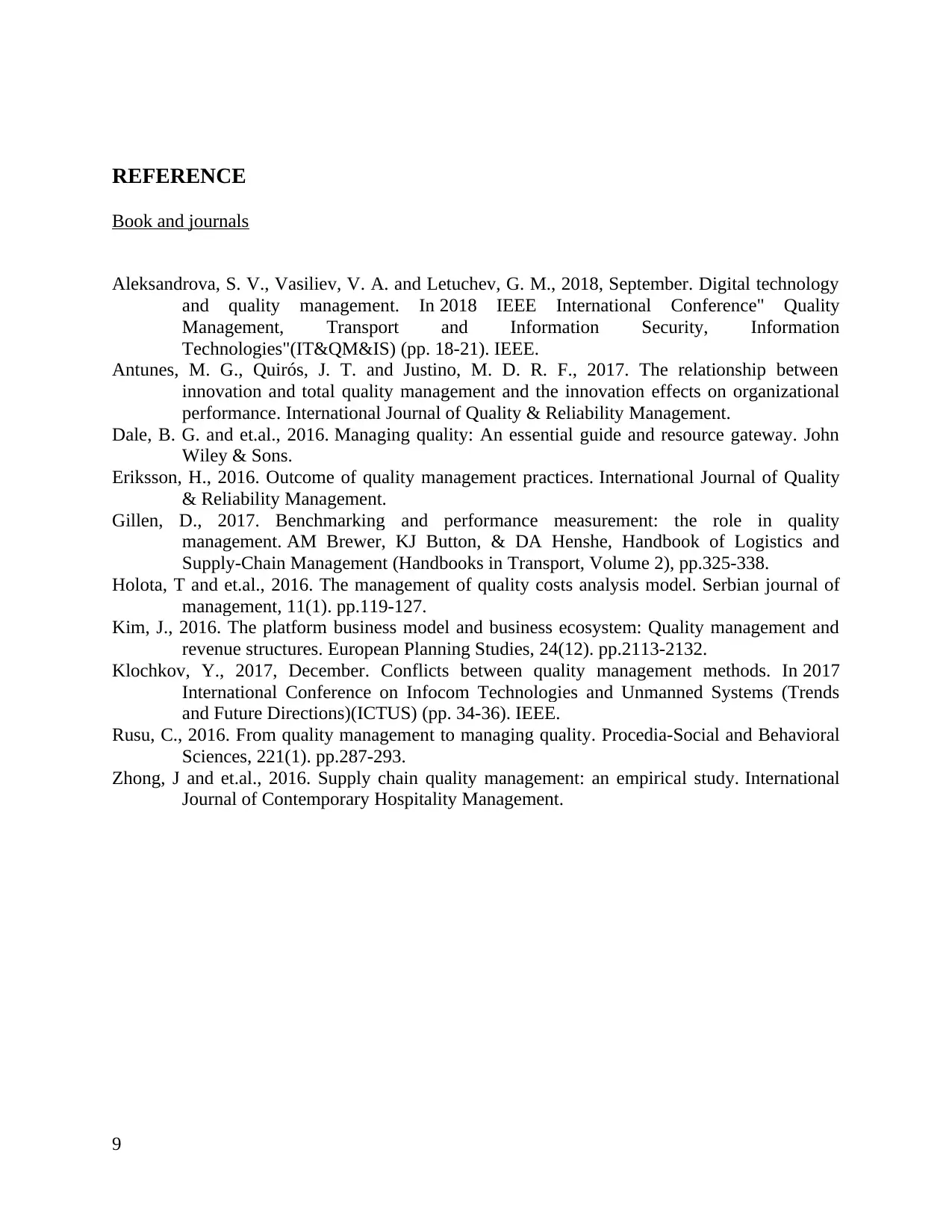
REFERENCE
Book and journals
Aleksandrova, S. V., Vasiliev, V. A. and Letuchev, G. M., 2018, September. Digital technology
and quality management. In 2018 IEEE International Conference" Quality
Management, Transport and Information Security, Information
Technologies"(IT&QM&IS) (pp. 18-21). IEEE.
Antunes, M. G., Quirós, J. T. and Justino, M. D. R. F., 2017. The relationship between
innovation and total quality management and the innovation effects on organizational
performance. International Journal of Quality & Reliability Management.
Dale, B. G. and et.al., 2016. Managing quality: An essential guide and resource gateway. John
Wiley & Sons.
Eriksson, H., 2016. Outcome of quality management practices. International Journal of Quality
& Reliability Management.
Gillen, D., 2017. Benchmarking and performance measurement: the role in quality
management. AM Brewer, KJ Button, & DA Henshe, Handbook of Logistics and
Supply-Chain Management (Handbooks in Transport, Volume 2), pp.325-338.
Holota, T and et.al., 2016. The management of quality costs analysis model. Serbian journal of
management, 11(1). pp.119-127.
Kim, J., 2016. The platform business model and business ecosystem: Quality management and
revenue structures. European Planning Studies, 24(12). pp.2113-2132.
Klochkov, Y., 2017, December. Conflicts between quality management methods. In 2017
International Conference on Infocom Technologies and Unmanned Systems (Trends
and Future Directions)(ICTUS) (pp. 34-36). IEEE.
Rusu, C., 2016. From quality management to managing quality. Procedia-Social and Behavioral
Sciences, 221(1). pp.287-293.
Zhong, J and et.al., 2016. Supply chain quality management: an empirical study. International
Journal of Contemporary Hospitality Management.
9
Book and journals
Aleksandrova, S. V., Vasiliev, V. A. and Letuchev, G. M., 2018, September. Digital technology
and quality management. In 2018 IEEE International Conference" Quality
Management, Transport and Information Security, Information
Technologies"(IT&QM&IS) (pp. 18-21). IEEE.
Antunes, M. G., Quirós, J. T. and Justino, M. D. R. F., 2017. The relationship between
innovation and total quality management and the innovation effects on organizational
performance. International Journal of Quality & Reliability Management.
Dale, B. G. and et.al., 2016. Managing quality: An essential guide and resource gateway. John
Wiley & Sons.
Eriksson, H., 2016. Outcome of quality management practices. International Journal of Quality
& Reliability Management.
Gillen, D., 2017. Benchmarking and performance measurement: the role in quality
management. AM Brewer, KJ Button, & DA Henshe, Handbook of Logistics and
Supply-Chain Management (Handbooks in Transport, Volume 2), pp.325-338.
Holota, T and et.al., 2016. The management of quality costs analysis model. Serbian journal of
management, 11(1). pp.119-127.
Kim, J., 2016. The platform business model and business ecosystem: Quality management and
revenue structures. European Planning Studies, 24(12). pp.2113-2132.
Klochkov, Y., 2017, December. Conflicts between quality management methods. In 2017
International Conference on Infocom Technologies and Unmanned Systems (Trends
and Future Directions)(ICTUS) (pp. 34-36). IEEE.
Rusu, C., 2016. From quality management to managing quality. Procedia-Social and Behavioral
Sciences, 221(1). pp.287-293.
Zhong, J and et.al., 2016. Supply chain quality management: an empirical study. International
Journal of Contemporary Hospitality Management.
9
⊘ This is a preview!⊘
Do you want full access?
Subscribe today to unlock all pages.

Trusted by 1+ million students worldwide
1 out of 9
Related Documents
Your All-in-One AI-Powered Toolkit for Academic Success.
+13062052269
info@desklib.com
Available 24*7 on WhatsApp / Email
![[object Object]](/_next/static/media/star-bottom.7253800d.svg)
Unlock your academic potential
Copyright © 2020–2026 A2Z Services. All Rights Reserved. Developed and managed by ZUCOL.





